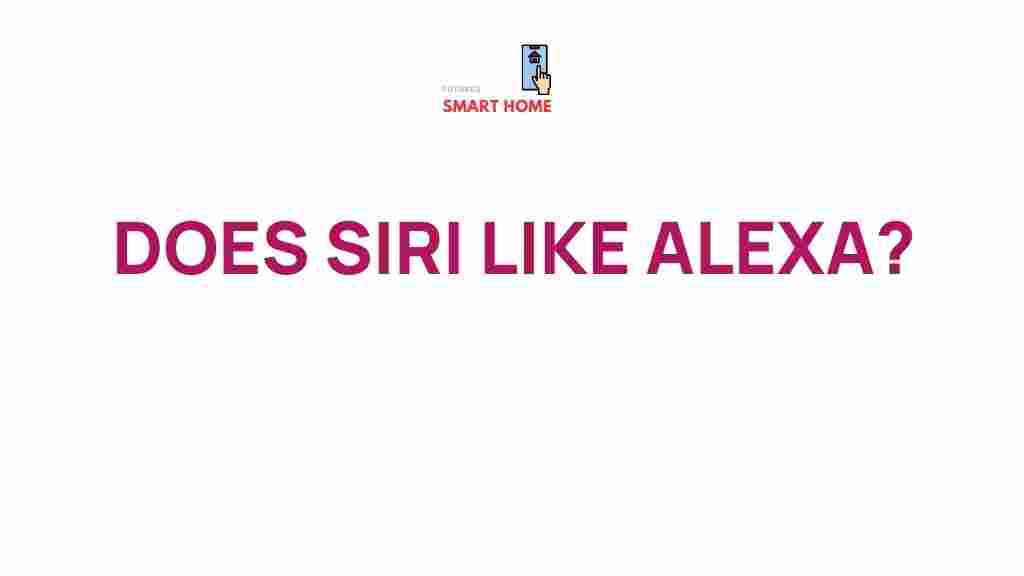The Secret Rivalry Between Siri and Alexa Revealed
In the rapidly evolving world of technology, virtual assistants have become an integral part of our daily lives. Two of the most prominent players in this field are Siri, developed by Apple, and Alexa, created by Amazon. Their rivalry not only represents a battle between two tech giants but also showcases the advances in artificial intelligence and user interaction. In this article, we will uncover the dynamics of this competition, explore their unique features, and provide insights into the future of virtual assistants.
The Rise of Virtual Assistants
Virtual assistants have transformed how we interact with technology. From managing our calendars to controlling smart home devices, these AI-driven tools aim to make our lives easier. With the introduction of Siri in 2011 and Alexa in 2014, the landscape of personal assistants has changed dramatically. Both platforms have distinct strengths and weaknesses that cater to different user needs.
Understanding Siri and Alexa
Siri and Alexa are not just voice-activated tools; they are sophisticated systems designed to understand and interpret human language. Let’s delve deeper into their characteristics:
- Siri: Integrated into Apple devices, Siri is known for its seamless functionality within the Apple ecosystem. It excels in performing tasks related to messaging, calling, and managing schedules.
- Alexa: Primarily associated with Amazon Echo products, Alexa is recognized for its compatibility with a wide range of smart home devices. It is also known for its extensive skill set, allowing it to perform numerous third-party tasks.
The Competition: A Closer Look
The competition between Siri and Alexa is fierce, fueled by the desire for dominance in the virtual assistant market. Here are some key areas of rivalry:
1. Ecosystem Integration
Siri benefits from being part of Apple’s ecosystem, providing a smooth experience for users with multiple Apple devices. On the other hand, Alexa is designed to integrate with a vast array of smart home products, making it a versatile choice for users looking to automate their homes.
2. Voice Recognition and AI Capabilities
Both virtual assistants utilize advanced voice recognition technology, but their performance can vary based on context. Here’s what to consider:
- Siri: Excels in understanding commands related to iOS and macOS functionalities.
- Alexa: Often better at recognizing commands related to smart home devices and third-party applications.
3. Customization and Skills
Alexa offers a broader range of skills due to its open platform, allowing developers to create custom commands. Siri, while more limited in this regard, provides a more curated experience for Apple users.
Step-by-Step Comparison
Let’s break down the comparison between Siri and Alexa into actionable insights:
Step 1: Device Compatibility
Choosing between Siri and Alexa often comes down to the devices you already own. Here’s a quick reference:
- Apple Users: If you own an iPhone, iPad, or Mac, Siri is the most convenient choice.
- Smart Home Enthusiasts: If you have a variety of smart home devices from different brands, Alexa may be the better option.
Step 2: Understanding Your Needs
Identify what you need from a virtual assistant:
- For Personal Management: Siri’s integration with Apple services makes it ideal for managing calls, messages, and reminders.
- For Smart Home Control: Alexa’s compatibility with a wide range of devices makes it a superior choice for home automation.
Step 3: Privacy Considerations
Both Siri and Alexa have faced scrutiny over privacy concerns. Here are some points to consider:
- Siri: Apple emphasizes privacy as a core value, minimizing data collection and processing commands on-device.
- Alexa: Amazon uses cloud processing, which can raise concerns about data security and user privacy.
Troubleshooting Tips
Users may encounter issues while using either virtual assistant. Here are some common troubleshooting tips:
For Siri:
- Issue: Siri doesn’t respond.
- Solution: Check if the device is connected to the internet and that Siri is enabled in settings.
For Alexa:
- Issue: Alexa doesn’t understand commands.
- Solution: Ensure the echo device is placed in an area with minimal background noise, and consider rephrasing the command.
The Future of Virtual Assistants
The competition between Siri and Alexa is likely to drive innovation in the virtual assistant space. As technology advances, we can expect:
- Improved natural language processing, allowing for more conversational interactions.
- Greater interoperability between devices, making it easier to use multiple assistants.
- Enhanced privacy features, addressing user concerns about data security.
Conclusion
The rivalry between Siri and Alexa reflects the broader competition in the technology industry, where innovation is key. As users continue to seek efficient and intelligent virtual assistants, both platforms will strive to enhance their offerings. Whether you are an Apple loyalist or an Amazon enthusiast, understanding the strengths and weaknesses of each can help you make the best choice for your needs.
For more insights on technology and virtual assistants, visit this resource. Stay tuned as the landscape of AI continues to evolve, bringing new features and capabilities to our fingertips.
This article is in the category Reviews and created by FutureSmarthome Team
